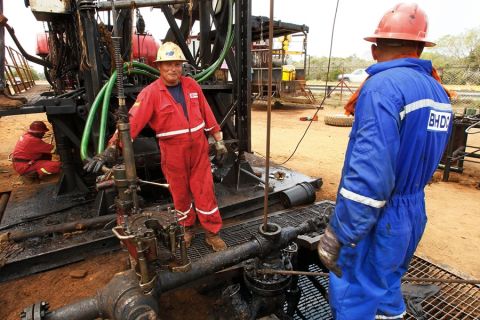[Editor's note: This story was updated at 3:48 p.m. CDT April 30.]
Baker Hughes Inc. reported negative free cash flow for the first quarter at a time energy investors have been pushing companies to aggressively shore up capital for dividends and buybacks, sending its shares down as much as 8.5%.
Oilfield service companies, including bellweather Schlumberger Ltd. and Halliburton Co., are planning to spend less in 2019, following in the footsteps of oil producers who have cut budgets in response to shareholder pressure for capital discipline rather than spending to grow their top line.
Baker Hughes on April 30 posted negative free cash flow of $419 million, compared with analysts' estimates of a positive $188.5 million.
Baker Hughes CFO Brian Worrell attributed the reasons for the negative cash flow to annual payments related to employee compensation, delay in realizing some revenue and higher inventory that was built in expectations of more activity in the forthcoming quarters.
"It's an overall negative print because of the cash flow... working capital has been an issue for a lot of oilfield services companies, but this was particularly weak and their capital expenditure also was higher-than-expected," BMO Capital Markets analyst Daniel Boyd said.
Jennifer Rowland, an analyst at Edward Jones, called the negative free cash flow "unsettling for people."
Worrell added the company continues to expect to generate free cash flow this year. Analysts on average estimate it to be about $1.2 billion.
Shares of the Houston-based company were down 6.4% at $24.31 as investors shrugged off a slight beat on quarterly profit. The quarterly profit beat was driven by higher demand for equipment and services from its international customers.
International revenue from the company's oilfield services unit surged 15.5% to $1.83 billion, while total revenue from its oilfield services business, which constitutes roughly half of its total sales, rose a better-than-expected 12%.
Unlike bigger players Halliburton and Schlumberger, Baker Hughes has limited exposure to the North American pressure pumping sector, where demand has weakened.
Adjusted net income attributable to the company rose to $76 million, or 15 cents per share, in the three months ended March 31, from $38 million, or 9 cents per share, a year earlier.
Analysts on average had expected the company to report a profit of 13 cents per share.
Total revenue rose to $5.62 billion from $5.4 billion.
Recommended Reading
US Decision on Venezuelan License to Dictate Production Flow
2024-04-05 - The outlook for Venezuela’s oil industry appears uncertain, Rystad Energy said April 4 in a research report, as a license issued by the U.S. Office of Assets Control (OFAC) is set to expire on April 18.
Vietnam Seeks Delicate Balance Among US, China, Russia
2024-02-08 - Ongoing U.S. tensions with China and Russia offer Vietnam an opportunity to boost economic ties with the former if American investors can steer past geopolitical smokescreens and destine funds for infrastructure, power and LNG projects all somewhat tied to Vietnam’s manufacturing sector.
Everywhere All at Once: Woodside CEO Touts Current Global Portfolio
2024-03-05 - Meg O’Neill, the CEO of Australian energy giant Woodside Energy, is overseeing the “next wave” of growth projects around the globe, including developments in the Gulf of Mexico, offshore Senegal and further LNG expansion.
The Jones Act: An Old Law on a Voyage to Nowhere
2024-04-12 - Keeping up with the Jones Act is a burden for the energy industry, but efforts to repeal the 104-year-old law may be dead in the water.




